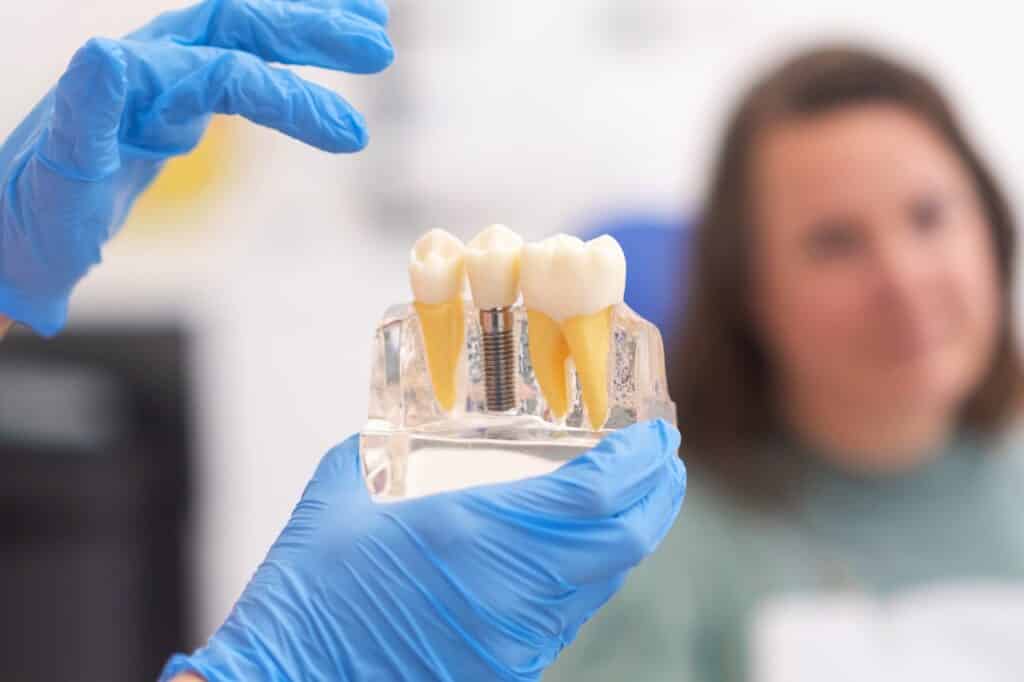Tooth loss can occur for various reasons, including injury, gum disease, or tooth decay. Missing teeth not only impact the appearance of one’s smile but can also lead to other oral health issues such as bone loss, misalignment, and jaw pain.
Dental implants have emerged as an effective solution for replacing missing teeth, offering numerous benefits and a natural-looking, long-lasting result. This advanced dental treatment can restore your teeth’ functionality and enhance your smile’s aesthetics.
At Pickering Dental Services, we specialize in a wide range of family dentistry services, including implant dentistry, to help our patients maintain optimal oral health. It is crucial to educate yourself about dental implants, their types, benefits, and what to expect during the process to make informed decisions about your dental care.
Continue reading to learn more about dental implants and how our team of professionals at Pickering Dental Services can help you achieve a healthy and confident smile with this innovative dental treatment.
The Science Behind Dental Implants
Dental implants consist of three primary components: the implant, the abutment, and the dental crown. The implant, usually made from titanium or zirconia, serves as the root replacement and is surgically inserted into the jawbone.Following the implant placement, a process called osseointegration takes place, wherein the jawbone fuses with the implant to create a strong and stable foundation for the dental crown. The abutment connects the implant to the crown, which is designed to resemble a natural tooth aesthetically and functionally.
Types of Dental Implants
There are various types of dental implants available, catering to individual needs and varying jawbone conditions. The three main types of dental implants include:
1. Endosteal Implants: As the most commonly used implant type, endosteal implants are placed directly into the jawbone. The implant post, usually made of titanium, resembles a small screw and is inserted into the bone. Suitable for patients with a healthy and substantial jawbone, endosteal implants are often used in place of conventional bridges or dentures.
2. Subperiosteal Implants: Subperiosteal implants are an alternative for people with insufficient bone mass for endosteal implants. Instead of being inserted into the jawbone, subperiosteal implants sit on top of the bone within the gum tissue. The dental prosthetic is then attached to the metal framework that protrudes through the gums.
3. Zygomatic Implants: These implants are the least common and mostly used when there isn’t enough jawbone in the upper jaw for endosteal implants. Zygomatic implants anchor into the cheekbones (zygoma) rather than the jawbone. Due to the complexity of this procedure, zygomatic implants are reserved for specific cases and are only performed by highly specialized dental surgeons.
Benefits of Dental Implants
Dental implants offer several benefits for individuals with tooth loss, including:
1. Restoring Functionality: Dental implants provide a stable foundation for dental prosthetics, allowing individuals to enjoy mealtimes and speak with ease.
2. Preventing Bone Loss: When a tooth is lost, the surrounding bone may begin to deteriorate due to a lack of stimulation from the tooth’s root. Dental implants stimulate the bone, promoting bone growth and helping to prevent further bone loss.
3. Improved Appearance: Dental implants enhance patients’ smiles by replacing missing teeth with natural-looking, custom-designed dental crowns.
4. Protecting Adjacent Teeth: Unlike dental bridges, dental implants do not require grinding down neighbouring teeth, preserving the integrity of the surrounding teeth.
5. Longevity: With proper care, dental implants can last a lifetime, making them a durable and cost-effective solution for tooth replacement.
What to Expect During the Dental Implant Process
Understanding what to expect during the dental implant process can help provide peace of mind and reduce anxiety. The general process for dental implant placement includes:
1. Consultation: During your initial consultation, a dental professional will assess your oral health, review your medical history, and determine whether dental implants are an appropriate treatment option. Advanced imaging technologies such as X-rays and CT scans may be used to evaluate bone density and the positioning of your teeth and nerves.
2. Preliminary Procedures: Depending on your dental health and specific situation, preliminary procedures such as tooth extractions, bone grafting, or sinus lifting might be necessary.
3. Surgery: During the dental implant surgery, your dentist will administer anesthesia to ensure your comfort. Next, the dental professional surgically places the implant(s) into the jawbone. In some cases, temporary teeth may be attached to the implants.
4. Osseointegration & Healing: It may take several months for the implants to fully integrate with the jawbone. During this time, patients are advised to maintain good oral hygiene practices and follow any post-operative care instructions provided by their dentist.
5. Abutment Placement & Crown Fitting: Once osseointegration is complete, your dentist will attach the abutment to the dental implant. Finally, dental impressions are taken to create your custom dental crown, which is designed to match the shape, size, and colour of your natural teeth.
Final Thoughts
Dental implants provide an effective solution for addressing tooth loss, offering numerous benefits such as restored functionality, improved appearance, and prevention of bone loss. By examining the different types of dental implants and understanding what to expect during the implant process, you can decide whether this innovative dental treatment is suitable for your specific needs.
Consult with the experienced dental team at Pickering Dental Services to discuss dental implant options further and develop a tailored treatment plan to help you achieve a healthy and confident smile. Book your appointment today to learn more about dental implants and the wide range of family dentistry services we offer.



